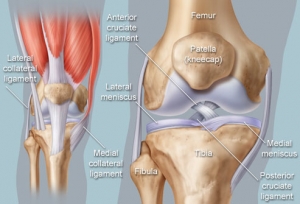News & Advice
Football Knee Injuries
Football knee injuries seem to be more common than ever, even though the sport's safety continues to improve each year through science, data and nutrition. Why? Because of the science, data and nutrition improvements, the demands from football players increases, meaning more strain on body parts, in particular the knee.
Call 01282 453 110 to book your appointment.
As football is one of the most popular sports to watch and play, it’s no surprise that we treat a lot of patients with football knee injuries. This is less to do with the fact that football is a dangerous sport, and more to do with the fact that it is a high intensity sport that is played on a soft, spongey surface.
90 minutes of football can put a huge amount of strain and pressure on the mechanics of our knees, especially when you consider how often we make sudden sprints, twists and turns on a soft surface while our studs are implanted into the ground. The studs are there for support, to ensure we don’t slip – but this is also the reason why we treat so many football knee injuries. The studs do their job and keep us from falling over but the momentum can carry through the rest of our body causing injuries to our knees.
Most Common Football Knee Injuries
Anterior Cruciate Ligament
Knee Ligament injuries are the most common, particularly the Anterior Cruciate Ligament (Virgil Van Dijk) and Medial Collateral Ligament. These injuries occur when there is too much strain put on our knees, either a twisting or turning action damaging our knee ligaments or direct contact from another player can cause damage.
If the ACL is completely ruptured, surgery is the only option, and rehabilitation post surgery can take up to a year. There is no quick fix unfortunately. Understandably, confidence can be a big issue after suffering an injury like this, as naturally we wonder if it we will ever be as strong as we were and will it happen again. Full recoveries are not uncommon so it’s important to remain positive and focused with your rehabilitation!
Meniscal Tear
These cartilage tears can occur when our knee twists whilst it’s bent, such as changing direction in football. If this is only a minor tear, then conservative Physiotherapy treatment can help, such as, Acupuncture, which increases blood flow to that area to promote healing. If it is a complete tear, again, surgery may be required in the form of an arthroscopy to repair the torn meniscus.
If we think of ligaments like a branch from a tree – they’re flexible and strong, however, when we apply too much force or twist them, they can snap and appear to be frayed. The branch doesn’t always split in half, but some parts of it appear to tear away from the rest. This is the same with ligaments. They’re incredibly versatile, but like most things, they have a breaking point.
Rehabilitation
We’re here to help, and we have a number of clinics for you to pick from to start your rehabilitation. Choose between our Burnley and Padiham clinics.
Our role is to aid your return to football as safely and as soon as possible, following an injury. An MCL sprain is much easier to treat, as the ligament is on the outside of the joint, so we can promote healing through the use of electrotherapy, such as ultrasound or laser, massaging over the ligament to increase blood flow and aid healing. We also tailor specific exercises to strengthen your muscles that support the joint and start specific drill training. Find out more about our Sports Rehab Treatments
It Happens to the Best
Footballer, Luis Suarez tore his meniscus, but with intensive Physiotherapy every day, he was able to play in the World Cup just 6 weeks post injury, which shows the importance of seeking Physiotherapy as soon as possible!
If you suffer regularly with football knee injuries or you’ve got an old injury you can’t shake off, we can help you become even stronger than before. Use our FREE Ask A Physio service if you have any queries or would like some advice beforehand.
